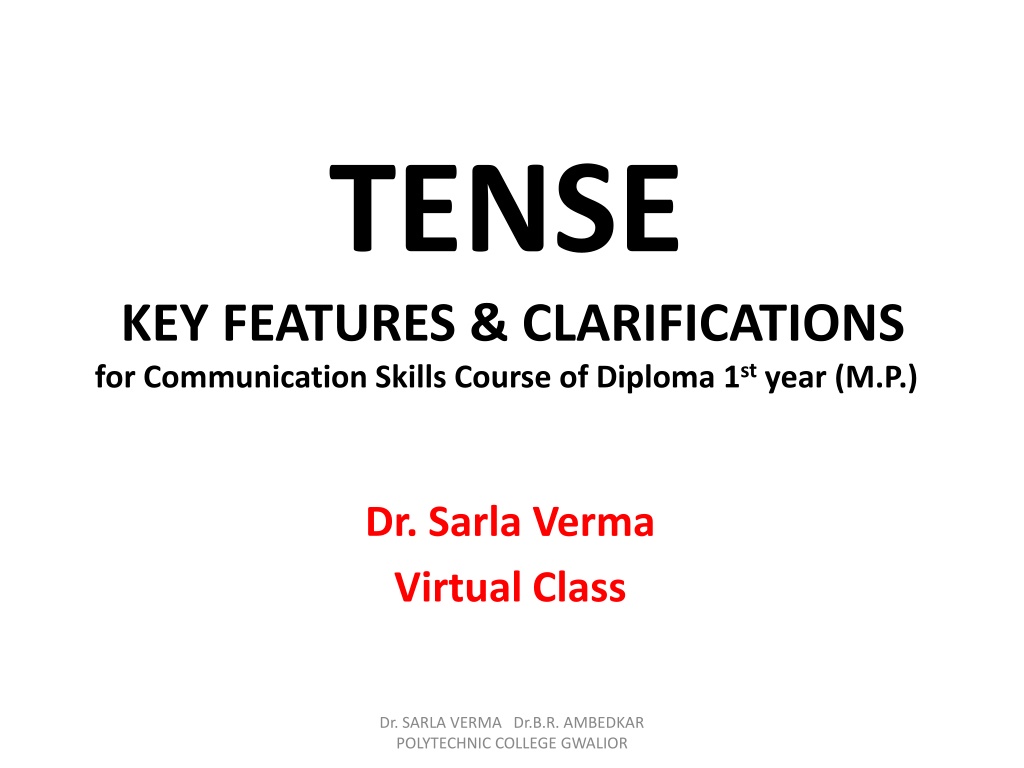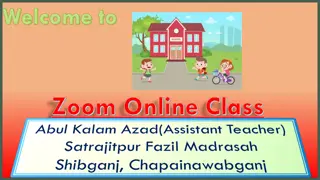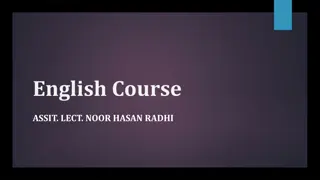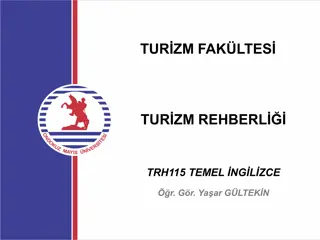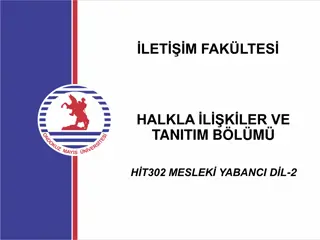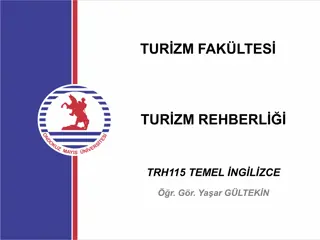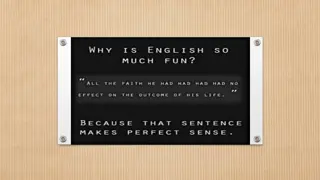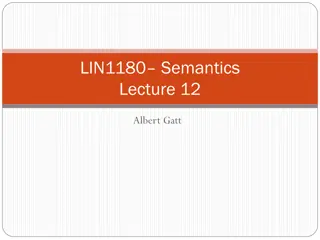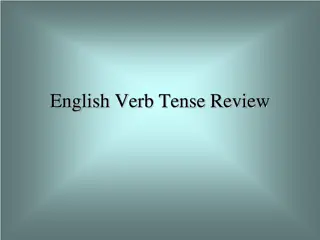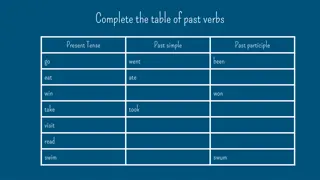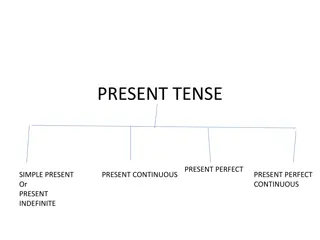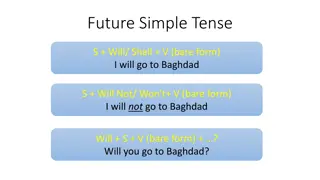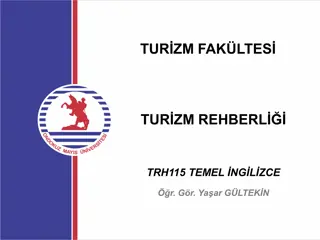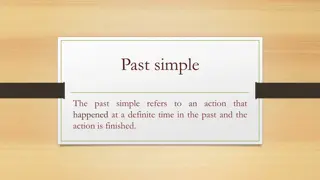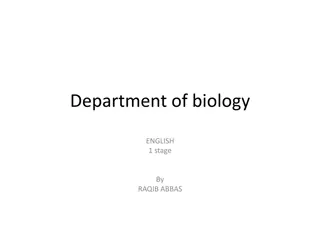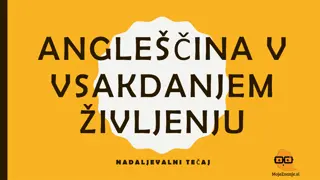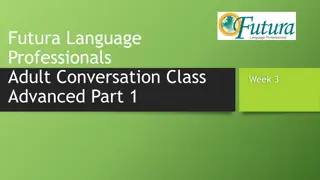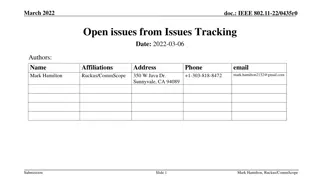Understanding Tense in Communication Skills Course - Key Features and Clarifications
Explore the significance of tense in communication skills with Dr. Sarla Verma's virtual class for Diploma 1st-year students. Learn about verb forms, concepts of time, simple present tense, and highlights of present simple and continuous tenses. Understand temporary and permanent situations through practical examples.
Download Presentation

Please find below an Image/Link to download the presentation.
The content on the website is provided AS IS for your information and personal use only. It may not be sold, licensed, or shared on other websites without obtaining consent from the author. Download presentation by click this link. If you encounter any issues during the download, it is possible that the publisher has removed the file from their server.
E N D
Presentation Transcript
TENSE KEY FEATURES & CLARIFICATIONS for Communication Skills Course of Diploma 1styear (M.P.) Dr. Sarla Verma Virtual Class Dr. SARLA VERMA Dr.B.R. AMBEDKAR POLYTECHNIC COLLEGE GWALIOR
TENSE TENSE IS THE VERB FORM THAT SUGGESTS THE TIME OF ACTION OR THE STATE OF ACTION : - IN CONTINUATION OR COMPLETED Dr. SARLA VERMA Dr.B.R. AMBEDKAR POLYTECHNIC COLLEGE GWALIOR
TENSE AND THE CONCEPT OF TIME TIME AS SUCH IS A CONTINUOUS ENTITY. It is CONTINUITY OF ........NOW....NOW....NOW.....NOW...... For our convenience and understanding PRESENT ---- NOW (real, in our control) PAST ---BEFORE NOW (fact, can not be changed) FUTURE ---- AFTER NOW (hypothetical, as per plan, imaginary, subject to conditions) Dr. SARLA VERMA Dr.B.R. AMBEDKAR POLYTECHNIC COLLEGE GWALIOR
TENSE VERB FORMS Dr. SARLA VERMA Dr.B.R. AMBEDKAR POLYTECHNIC COLLEGE GWALIOR
Three forms of the Verbs V1 V2 V3 Do Did Done See Saw Seen Eat Ate Eaten Draw Drew Drawn Break Broke Broken Become Became Become Speak Spoke Spoken
SIMPLE PRESENT SINGULAR PLURAL FIRST PERSON I We SECOND PERSON You You, You all THIRD PERSON He/She/It/This/That/ Who/Which, Ramesh, Mumbai, My mother, My pet dog, This fan, Honesty, Life They, People, These, Those, Cities, Lives, Problems Dr. SARLA VERMA Dr.B.R. AMBEDKAR POLYTECHNIC COLLEGE GWALIOR
TENSE HIGHLIGHTS PRESENT SIMPLE Universal truths Experimental facts Recurrent actions Habits or character Permanent situations Verbs of perception Verbs of mental activity Verbs of feelings/emotions Verbs of possession PRESENT CONTINUOUS Action in Progress at the time of speaking Action in progress in present (time not mentioned) Temporary situation Deliberate actions Dr. SARLA VERMA Dr.B.R. AMBEDKAR POLYTECHNIC COLLEGE GWALIOR
Temporary and Permanent situations Examples: His friend is standing outside the classroom. The Taj stands on the bank of river Yamuna. ( not is standing ) The boy is running for the bus. This highway runs from Agra to Mumbai. ( not is running ) Dr. SARLA VERMA Dr.B.R. AMBEDKAR POLYTECHNIC COLLEGE GWALIOR
Some verbs are used in Simple Present Tense and not in Continuous Tense For natural and involuntary actions the simple present is used. They may rarely be used in the continuous form for deliberate actions only. Verbs of perception (see, hear, smell, feel, taste) Example: I smell something burning. (involuntary, natural) Why are you smelling the milk? It is fresh. (deliberate)
Verbs of Perception You see a lot of greenery in the campus. We hear a lot of noise outside due to traffic. Ice-creams taste good. Mangoes taste sweet. As we enter the garden we smell sweet fragrance of roses. Why are you tasting the curd? Its fresh.(deliberate) I feel nervous on stage. How are you feeling after taking the treatment? I am feeling better now. (deliberate) Dr. SARLA VERMA Dr.B.R. AMBEDKAR POLYTECHNIC COLLEGE GWALIOR
Verbs expressing feelings and emotions (like, dislike, fear, hate, love etc.) I hate this job. People fear earthquakes. He likes his new job? He doesn t like movies. Verbs of mental activity (agree, know, think, assume, believe, imagine, trust) I know him well.( not knowing) I believe he is right. I agree with you. I think he will pass. What are you thinking? (deliberate action)
Verbs of possession (belong, possess, owe, own etc.) Who owns this house? The car belongs to my brother. Both the simple and continuous forms of the present tense may be used with a future reference: Example: He leaves for Bombay next week. He is leaving for Bombay next week.
PRESENT PERFECT vs CONTINUOUS has /have been V-ing PRESENT PERFECT (has/have V3) Action completed recently in present. Action began in past and is still continuing in Present Action completed but time not mentioned. State of action is connected with present also. Action may be interrupted. UNINTERRUPTED Action Dr. SARLA VERMA Dr.B.R. AMBEDKAR POLYTECHNIC COLLEGE GWALIOR
Present Perfect vs Present Perfect Continuous I have been teaching for the last 15 years. I have taught for 15 years. It has been raining since Friday. It has rained for four days. I have been winning College Championship since last three years. (2017,2018 & 2019) I have won College Championship for three years. (in 2016, 2017 and in 2019). Dr. SARLA VERMA Dr.B.R. AMBEDKAR POLYTECHNIC COLLEGE GWALIOR
since and for Since- point of time For period of time Since 1993, Since Friday Since morning Since childhood Since youth For 10 years For a week For ages For the whole day For 3 hours Dr. SARLA VERMA Dr.B.R. AMBEDKAR POLYTECHNIC COLLEGE GWALIOR
Comparison PRESENT PERFECT (has/have V3) SIMPLE PAST (V2) Action completed in past. Action completed in Present. Action very much connected with Present. Action has NO connection with Present. Dr. SARLA VERMA Dr.B.R. AMBEDKAR POLYTECHNIC COLLEGE GWALIOR
Present Perfect and Simple Past I have taken tea. I took tea before leaving my house. I saw this movie last week. I have seen the movie. My father has been 70 years old last January. My father was 70 years old last January. I have learnt German. I learnt German. We have been good friends. We were good friends. Dr. SARLA VERMA Dr.B.R. AMBEDKAR POLYTECHNIC COLLEGE GWALIOR
SIMPLE PAST (V2) vs PAST PERFECT (had V3) Action completed in the past. Action completed in the past. Action completed before another action happened in the past. Actions in Remote past. (Earlier in the past) Actions --- later in the past. Dr. SARLA VERMA Dr.B.R. AMBEDKAR POLYTECHNIC COLLEGE GWALIOR
SIMPLE PAST Vs PAST PERFECT The doctor came when the patient had died. The train left after I had reached the station. The plane had already landed when we reached the airport yesterday. The doctor had come when the patient died. The train had left before I reached the station. We had already reached the airport yesterday before the plain landed. Dr. SARLA VERMA Dr.B.R. AMBEDKAR POLYTECHNIC COLLEGE GWALIOR
PAST PERFECT vs PAST PERFECT CONTINUOUS PAST PERFECT (had V3) PAST PERFECT CONTINUOUS (had been V-ing) Action began in the remote past and was continuing at the time of speaking (in the past). Action completed in the past When I reached Bhopal last Sunday, it had been raining since last three days over there. When I reached Bhopal last Sunday, it had rained for three days over there. Dr. SARLA VERMA Dr.B.R. AMBEDKAR POLYTECHNIC COLLEGE GWALIOR
vs FUTURE CONTINUOUS FUTURE SIMPLE (shall/will V1) (shall/will be v-ing) I shall write to you. I shall be doing job next year. He is going to write a book. Or He will write a book. We are going to shift to Delhi next month. or We shall shift to Delhi next month. He will be watching cricket match tomorrow and will not be available. He will be having lunch at 2p.m. in the afternoon. Dr. SARLA VERMA Dr.B.R. AMBEDKAR POLYTECHNIC COLLEGE GWALIOR
FUTURE PERFECT (will/shall have V3) If you come to my house late in the evening, I shall have left for Mumbai by then. They will have completed this project by the end of this month. The cricket match will have started by this time tomorrow. By the year end the contractor will have constructed your house. Dr. SARLA VERMA Dr.B.R. AMBEDKAR POLYTECHNIC COLLEGE GWALIOR
FUTURE PERFECT CONTINUOUS IS NOT USED TOO HYPOTHETICAL CONFUSING WE DO NOT STUDY Dr. SARLA VERMA Dr.B.R. AMBEDKAR POLYTECHNIC COLLEGE GWALIOR
THANKS dr_sarlaverma@rediffmail.com Dr. SARLA VERMA Dr.B.R. AMBEDKAR POLYTECHNIC COLLEGE GWALIOR
